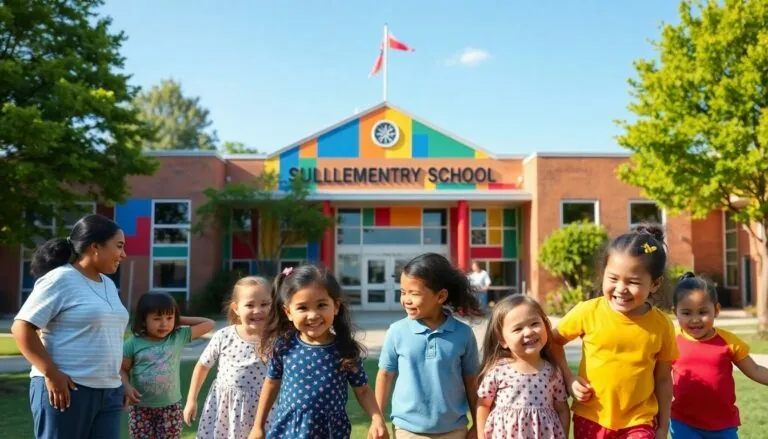Table of Contents
ToggleGeneral education in college might sound like a snooze-fest, but it’s actually the secret sauce to a well-rounded education. Think of it as the buffet of knowledge, where students sample everything from philosophy to science, and maybe even a dash of art history. It’s not just about fulfilling requirements; it’s about discovering passions and gaining skills that can spark creativity and critical thinking.
What Is General Education In College?
General education serves as a cornerstone of college curricula. It includes courses that expose students to a wide range of disciplines. Subjects like literature, mathematics, social sciences, and natural sciences form the core of this educational approach. Students gain essential skills through these courses, such as analytical thinking, communication, and problem-solving.
Courses in the humanities foster an appreciation for different cultures and ideas. Exposure to diverse viewpoints encourages critical thinking and creative expression. Science courses develop an understanding of the scientific method and encourage inquiry into the natural world.
With general education, students meet institutional requirements while exploring interests and broadening knowledge. This exploration isn’t merely for credit; it sparks passion and aids in personal and professional growth. Degrees often hinge on completing these courses, making their importance clear.
Additionally, general education emphasizes a well-rounded education over specialization. Students in fields like business or engineering benefit from courses in ethics and communication. Learning how to articulate thoughts effectively enhances overall academic and workplace performance.
Beyond the classroom, general education experiences contribute to social awareness. Classes may highlight societal issues, preparing students to engage with their communities thoughtfully. Learning to think critically about local and global challenges forms responsible citizenship.
General education in college cultivates a versatile skill set. It prepares students for various career paths while instilling a lifelong love of learning. Students emerge not just as specialists but as informed individuals ready to contribute to society.
Importance Of General Education
General education plays a crucial role in shaping a well-rounded college experience. It encourages exploration of various disciplines, aiding personal and academic development.
Broadening Knowledge Base
Courses in general education encompass a wide array of subjects. Students encounter literature, mathematics, social sciences, and natural sciences. Such exposure fosters a comprehensive view of the world. Engaging with diverse fields helps individuals find interests that transcend their major. Critical interdisciplinary knowledge enhances adaptability in an evolving job market. This varied learning experience prepares students for unexpected challenges. Insights gained from different domains contribute to innovative thinking and creative problem-solving. Ultimately, a broad knowledge base equips individuals with the skills necessary for informed decision-making.
Developing Critical Thinking Skills
Critical thinking skills are fundamental to both academic and real-life scenarios. General education courses emphasize analysis, evaluation, and synthesis of information. Students learn to assess arguments and identify biases within texts. This practice cultivates the ability to approach problems systematically. Constructing well-founded arguments becomes second nature through these courses. Such skills empower students to tackle complex issues effectively. They gain confidence in making reasoned choices in various contexts. Articulating thoughts clearly and logically leads to enhanced communication abilities. Overall, general education nurtures critical thinkers ready to engage with the complexities of modern society.
Components Of General Education Curriculum
General education encompasses various essential components that prepare students for academic and personal success.
Core Courses
Core courses form the backbone of the general education curriculum. These classes typically include subjects like literature, mathematics, social sciences, and natural sciences. Each course aims to provide foundational knowledge, fostering critical thinking and analytical skills. Literature courses enhance comprehension and communication abilities, while mathematics courses improve problem-solving and quantitative reasoning. Social sciences examine societal structures and behaviors, aiding students in understanding human dynamics. Natural sciences promote inquiry through experimentation and observation, cultivating an appreciation for the scientific process. Ultimately, core courses equip students with skills crucial for all aspects of their lives.
Electives
Electives offer students the chance to explore diverse subjects beyond core requirements. These courses allow individuals to pursue interests that resonate personally or professionally. Students might choose classes in fine arts, foreign languages, or specialized topics in sciences or humanities. Engaging in electives fosters creativity and broadens perspectives, contributing to a well-rounded education. Individuals develop new skills and insights, enhancing adaptability in an ever-changing job market. Exploring various disciplines invites personal growth, cultivating passions that can complement or diverge from a primary field of study. In essence, electives play a vital role in enriching the overall educational experience.
Differences Between General Education And Major Requirements
General education requirements focus on providing a broad knowledge base across various disciplines. These include courses in humanities, social sciences, mathematics, and natural sciences. The aim is to develop critical thinking, communication, and analytical skills, which benefit students regardless of their chosen majors.
Major requirements, however, concentrate on specific skills and knowledge needed for a particular field of study. Mastery of specialized subjects is essential for students aiming to excel in careers such as engineering, business, or healthcare. These major-specific courses deepen understanding and expertise within the chosen discipline.
General education cultivates a diverse skill set that can enhance adaptability in different job markets. Exposure to various subjects enables students to connect with broader themes, ideas, and cultural perspectives while they progress academically. For instance, literature courses may improve empathy and communication skills, benefiting students in any field.
Conversely, major requirements offer focused training, leading to proficiency within a specialized area. These courses often include lectures, labs, and internships that provide hands-on experience. Students gain practical skills that prepare them for immediate entry into their careers upon graduation.
Both general education and major requirements play crucial roles in shaping a well-rounded college experience. General education fosters critical life skills through a diverse curriculum, while major requirements prepare students for specific professional paths. Balancing both components ensures graduates possess both breadth and depth of knowledge, equipping them for various challenges in the workforce.
Challenges In General Education
General education presents various challenges that can impact students’ academic experiences. One significant challenge is the perceived relevance of courses. Students often question how subjects like philosophy or art history apply to their major, leading to disengagement. Curriculum overload also poses challenges; a broad set of requirements may overwhelm students, making it difficult to balance general education with major-specific studies.
Time management emerges as another hurdle. Students juggling multiple responsibilities struggle to allocate sufficient time for general education coursework. Many find it difficult to prioritize these courses while also meeting the demands of their major. Additionally, differing assessment methods across disciplines can confuse students, affecting their performance and motivation.
Another challenge lies in varied instructor approaches to general education. Teaching styles and expectations can differ significantly, leaving students unsure of how to succeed in these courses. Some professors emphasize traditional lectures, while others prefer active learning methods, creating inconsistencies in learning experiences.
Transfer of skills can also pose difficulties. Students may not recognize how skills gained in general education apply to real-world situations or their future careers. Bridging this gap requires intentional connections made by educators and proactive engagement from students.
Cultural and socioeconomic factors influence student experiences as well. Students from diverse backgrounds might approach general education differently, impacting their engagement and success. Addressing these disparities is crucial in promoting inclusivity within the curriculum.
By understanding these challenges, institutions can create supportive environments that enhance student success in general education. Tailoring approaches to address student concerns will foster greater engagement and a more meaningful educational experience.
Conclusion
General education in college plays a crucial role in shaping well-rounded individuals. It encourages exploration across diverse disciplines while fostering essential skills like critical thinking and effective communication. This broad knowledge base not only enhances personal growth but also prepares students for the complexities of the modern workforce.
By engaging in both core courses and electives, students develop a versatile skill set that transcends their major. This adaptability is invaluable in an evolving job market. As students navigate the challenges of general education, they cultivate a lifelong passion for learning and a deeper understanding of the world around them. Embracing this journey ultimately leads to more informed and engaged citizens ready to tackle societal issues.








